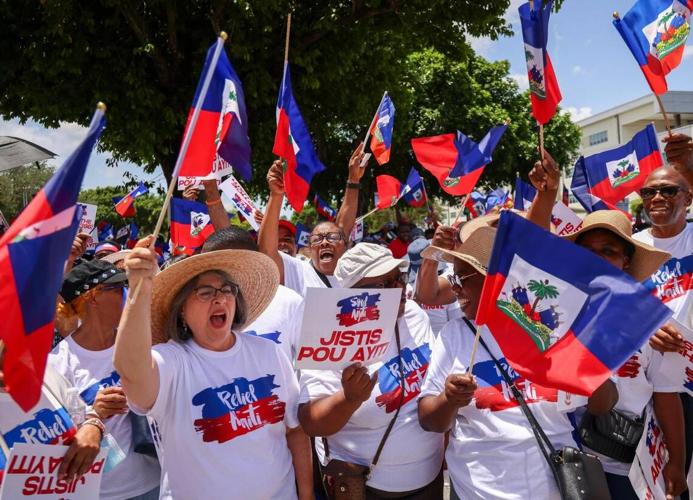

March in Miami demands justice for Haiti. July 9, 2023.


March in Miami demands justice for Haiti. July 9, 2023.
Thousands of Haitians came out in the streets in over 70 countries July 9 to demand “relief” for Haiti. The organizers estimate that approximately 100,000 Haitians took part. Besides in Haiti’s capital, Port-au-Prince, major marches took place in Croix-des-Bouquets, Carrefour, Saint-Marc, Gonaïves, Fort-Liberté, and Cap Haïtien inside the country.
There were big marches in the United States in North Miami; Washington, D.C.; Newark, New Jersey; the Hudson Valley and Brooklyn, New York; and Boston. In Canada, marches took place in Montréal, Ottawa and Toronto. There was also a protest in Paris, France.
Notably, the U.S., Canada and France are the main imperialist countries that have ravaged Haiti’s resources, exploited and impoverished its workers and farmers, and intervened militarily, leading to the current dire conditions.
The Haitians marched at the call of Grégory Toussaint, the pastor of a major Protestant church, the Tabernacle of Glory in North Miami, and the head of its radio station Shekinah FM. Religious leaders like former President Jean-Bertrand Aristide, who had been an ordained Roman Catholic priest, have also been prominent political leaders in Haiti.
It was a surprisingly large turnout on two weeks’ notice, but the Haitian community has pulled off big protests before. In particular on April 20, 1990, some 150,000 Haitians in New York City marched across the Brooklyn Bridge to protest the Food and Drug Administration policy that restricted Haitians from donating blood.
The slogan “souf pou Ayit” (Relief for Haiti) was displayed on the T-shirts worn by the marchers in Haiti. Many slogans on placards marchers carried, written in Haitian Creole, were sharply political. “Aba Kòripsyon!” (Down with corruption!) was common, along with “Fòk sa chanje!” (This must change!) and “Ayiti pap peri !” (Haiti will not perish!).
Many slogans were hostile to Ariel Henry, the unelected interim president kept in office with U.S. money and political support.
People on the Port-au-Prince march said that they had come to see a glimmer of change. One woman, her voice filled with indignation, told a Haïti-Liberté reporter, “We call on the de facto government and the international community that have plunged the country into disarray to change direction.”
Boston march: ‘Haiti won’t perish!’
Haitians march in Boston to protest the crisis in their homeland. July 9, 2023.
Massachusetts is home to more than 80,000 Haitians. The Boston march focused on a bill to end U.S. support for corrupt Haitian politicians and to end the practice of U.S. gun dealers supplying weapons and ammunition to Haitian criminals. It demanded that Washington support the United Nations embargo on sending weapons to Haiti.
Placards on the march from City Hall Plaza to Boston Commons proclaimed “Haiti won’t perish!” and “Haiti, God hasn’t forgotten you!” The speeches and chants at the Commons were concluded by Toussaint, speaking from Miami over a television link.
Toussaint said: “When our forefathers broke the shackles of slavery in 1804, they saw themselves leaving the house of servitude to step into the open plain of self-determination. But 200 years later, we find ourselves languishing in a wilderness of poverty, division, inequality, and oppression.” (Boston Globe, July 9)
He went on to say there were two types of “bandits” terrorizing Haiti: those “in sandals” and those “in suits.”
Haiti beset with crises
Haiti is beset with economic, political, social and cultural crises. The U.S. government in conjunction with the U.N. wants to send soldiers under U.N. auspices to control the situation and prop up their local puppets like Ariel Henry.
Over half of Haiti is food insecure. People regularly miss meals and get insufficient nutrition to maintain a normal weight. But the World Food Program and private NGOs have kept enough food flowing to prevent famine, when people die from the lack of food.
U.N. responsibility for the introduction of cholera into Haiti during an earlier military intervention creates another complication. Currently, there is an ongoing cholera outbreak with 772 deaths so far this year. (Haitilibre, July 4)
By John Catalinotto, managing editor, Workers World newspaper Adapted from the author’s presentation at a…
The following is part one of a talk given by the author to a meeting…
The island nation of Cuba has consistently struggled with one economic barrier above all others:…
Dozens of activists responded to a call by the United Farm Workers (UFW) for an…
In its ongoing genocidal campaign against the Palestinian people, Israel used drones May 2 to…
Palestinian and regional factions condemned the Israel Occupation Forces’ attack today on the Al-Dameer (Conscience)…